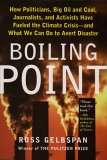Summary | Excerpt | Reviews | Beyond the Book | Readalikes | Genres & Themes | Author Bio
How Politicians, Big Oil and Coal, Journalists and Activists Are Fueling the Climate Crisis--and What We Can Do to Avert Disaster

Critics' Opinion:
Readers' Opinion:
First Published:
Jul 2004, 272 pages
Paperback:
Nov 2005, 304 pages
 Book Reviewed by:
Book Reviewed by:
BookBrowse Review Team
Buy This Book
The divisions between the United States and Europe and between Washington and the rest of the country are reflected in divisions within a number of industries--most notably the oil, auto, and insurance industries.
The first major oil company to acknowledge the urgency of climate change was British Petroleum, whose CEO, John Browne, announced in 1997 that the company was preparing itself to begin the transition to renewable energy in order to reduce the world's output of greenhouse gases.
The company subsequently launched a series of advertisements in which it declared that its initials no longer stood for British Petroleum but for 'Beyond Petroleum.' Observers credited the company with running those ads not on PBS--but during the baseball championship playoff series, aiming them clearly at a mainstream male American audience.
Beyond reshaping its public image, BP also spawned a new subsidiary--BP Solar--which has grown into the world's largest seller of solar systems.
Another oil giant, Royal Dutch/Shell, announced in 2001 that the industrial world could be getting half its energy from renewable energy and natural gas by 2020. (Natural gas emits only half as much carbon as coal per unit of energy and about two-thirds as much as oil.)
Shell followed that announcement by doubling its existing $500 million investment in renewables to $1 billion. The company said the continued investment would focus mainly on solar and wind power.
By contrast, the world's biggest oil company, ExxonMobil, with its extraordinarily close ties to the Bush White House, has continued to counteract the initiatives of BP, Shell, and others.
In late 2002, under pressure from shareholders, ExxonMobil made a token investment in research into gasoline-based hydrogen fuels. At the time, ExxonMobil declared that useful renewable energy was at least twenty years away. ExxonMobil's timetable for renewables was vividly contradicted the following day, when Toyota announced it was putting a fleet of hydrogen-powered fuel-cell cars on the streets of Tokyo.
Nevertheless, ExxonMobil's proposal to make 'dirty' hydrogen (from oil and coal, rather than from nonpolluting water) was adopted as presidential policy when President Bush included it as part of his State of the Union address in 2003.
Later that year, ExxonMobil announced that, its hydrogen initiative notwithstanding, carbon emissions would grow worldwide by 50 percent by the year 2020. The company made it clear it had no intention to move away from carbon-based fuels.
Despite the fact that humanity is now putting about 7 billion tons of heat-trapping carbon into the atmosphere every year, several top officials of ExxonMobil emphasized in a private conversation that the company has no intention of reducing its carbon output. As ExxonMobil's president, Lee Raymond, said in a recent interview: 'The mainstream of some so-called environmentalists or politically correct Europeans isn't the mainstream of all scientists or the White House. The world has been a lot warmer than it is now and it didn't have anything to do with carbon dioxide.'
The split within the carbon industry was underscored in the fall of 2003 when a top official of one of the country's largest utility companies blasted the Bush administration's position. 'I'm a lifelong Republican and an admirer of much of what President Bush has accomplished,' said Robert Luft, chairman of the board of the Entergy Corp. 'Still, I cannot express my frustration with his performance in this area. . . . Make no mistake. If today's leaders of government and business don't start understanding the need to take emission reductions seriously, we will leave a grim, grim legacy for our children and grandchildren.'
The responses of the insurance industry have been equally schizophrenic. The big European insurers have been politically proactive. In the early rounds of the climate talks, they aligned themselves with a coalition calling for the largest initial cuts (20 percent below 1990 levels)--the Alliance of Small Island States, from Jamaica to the Philippines, countries whose stability is threatened by rising sea levels and increasingly intense storm surges. The European insurers have also spent large amounts on public education, newspaper advertising, and political capital on the climate threat.
From Boiling Point by Ross Gelbspan, pages 93-126 of the hardcover edition. Reprinted with Permission from Basic Books – Copyright 2004.





The Funeral Cryer by Wenyan Lu
Debut novelist Wenyan Lu brings us this witty yet profound story about one woman's midlife reawakening in contemporary rural China.
Your guide toexceptional books
BookBrowse seeks out and recommends the best in contemporary fiction and nonfiction—books that not only engage and entertain but also deepen our understanding of ourselves and the world around us.